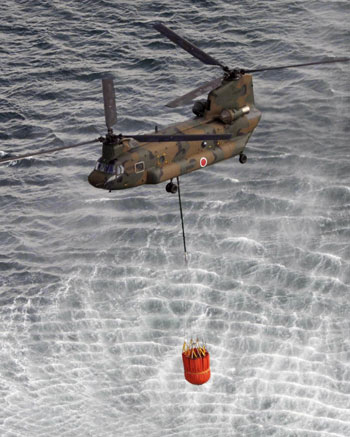Asia
Japanese choppers dump water on stricken reactor
Updated: 2011-03-17 21:42
(Agencies)
ZAO, Japan - Japan tried high-pressure water cannons, fire trucks and even helicopters that dropped batches of seawater in increasingly frantic attempts Thursday to cool an overheated nuclear complex as U.S. officials warned the situation was deteriorating.
The top U.S. nuclear regulatory official gave a far bleaker assessment of the crisis than the Japanese, and the U.S. ambassador warned U.S. citizens within 50 miles (80 kilometers) of the Fukushima Dai-ichi plant on the northeast coast to leave the area or at least remain indoors.
The Japanese government said it had no plans to expand its mandatory, 12-mile (20-kilometer) exclusion zone around the plant along the northeastern coast, while also urging people within 20 miles (30 kilometers) to stay inside.
 |
|
A Japan Air Self-Defense Force CH-47 Chinook helicopter collects water from the ocean to drop on the reactors at the Fukushima Daiichi nuclear plant in Fukushima March 17, 2011. [Photo/Agencies] |
The troubles at the nuclear complex were set in motion by last week's 9.0-magnitude earthquake and tsunami knocked out power and destroyed backup generators needed for the reactors' cooling systems. That added a nuclear crisis on top of twin natural disasters that likely killed well more than 10,000 people and left hundreds of thousands homeless.
Four of the plant's six reactors have faced serious crises involving fires, explosions, damage to the structures housing reactor cores, partial meltdowns or rising temperatures in the pools used to store spent nuclear fuel. Officials also recently announced that temperatures are rising in the spent fuel pools of the last two reactors.
Two Japanese military CH-47 Chinook helicopters began dumping seawater on the complex's damaged Unit 3 at 9:48 a.m. (0048 GMT, 8:48 p.m. EDT), defense ministry spokeswoman Kazumi Toyama said. The choppers dumped at least four loads on the reactor in just the first 10 minutes, though television footage showed much of it appearing to disperse in the wind.
Chopper crews flew missions of about 40 minutes each to limit their radiation exposure, passing over the reactor with loads of about 7,500 liters (about 2,000 gallons) of water.
The dousing is aimed at cooling the Unit 3 reactor, as well as replenishing water in that unit's cooling pool, where used fuel rods are stored, Toyama said. The plant's owner, Tokyo Electric Power Co., said earlier that pool was nearly empty, which would cause the rods to overheat and emit even more radiation.
Defense Minister Toshifumi Kitazawa told reporters that emergency workers had no choice but to try the water dumps before it was too late.
Along with the helicopter water drops, military vehicles designed to extinguish fires at plane crashes were also being used to spray the crippled Unit 3, said Mitsuru Yamazaki, a military spokesman. The high-pressure sprayers were to allow emergency workers to get water into the damaged unit while staying safely back from areas deemed to have too much radiation.
But special police units trying to use water cannons - normally used to quell rioters - failed in their attempt to cool the unit when the water failed to reach its target from safe distances, said Yasuhiro Hashimoto, a spokesman for the Nuclear And Industrial Safety Agency.
U.S. officials, meanwhile, said Unit 4 also was seriously at risk.
U.S. Nuclear Regulatory Commission Chairman Gregory Jaczko said at a congressional hearing in Washington that all the water was gone from that unit's spent fuel pool. Jaczko said anyone who gets close to the plant could face potentially lethal doses of radiation.
"We believe radiation levels are extremely high," he said.
Specials

Earthquake Hits Japan
A massive 8.8 magnitude quake hit the northeast coast of Japan on March 11,2011.

NPC & CPPCC sessions
Lawmakers and political advisers gather in Beijing to discuss major issues.

Pictures: quake aftermath
A massive earthquake hit Japan hard, leaving thousands dead.